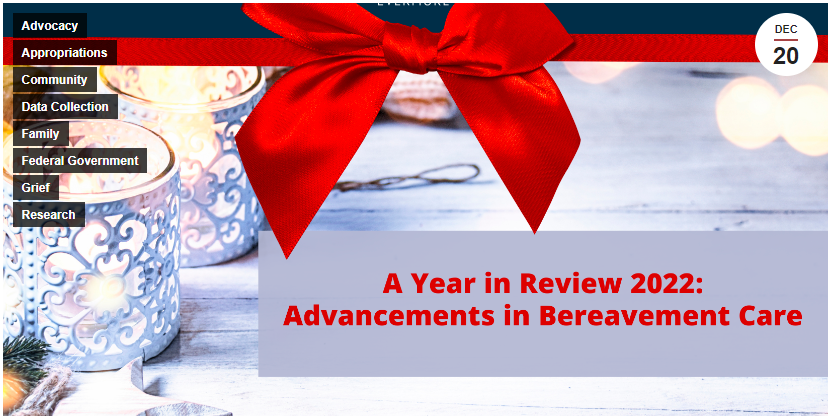A Year in Review 2022: Advancements in Bereavement Care 12/20
In 2022, our community of supporters has grown by more than 50 percent for the second consecutive year. Wharton Club members & guests are invited!

In 2022, our community of supporters has grown by more than 50 percent for the second consecutive year. Our movement consists of people from every corner of America – from truck drivers to professors to homeschoolers and executives. We unite in solidarity to create a more compassionate world for those who will follow us. What do we do with the pain of loss? We create change.
We’ve done that in 2022, and we are on the cusp of much more. This year has been the most consequential yet in the advancement of bereavement policy, and we could not have made it this far without you. As we reflect on 2022 and look towards 2023, there are some bright spots we want to share with you:
- We are winning mindshare among our nation’s most esteemed federal health leaders. In an event hosted by the Centers for Disease Control & Prevention (CDC), our founder and executive director Joyal Mulheron, had the distinguished opportunity to provide a private briefing to key U.S. Department of Health & Human Services agencies on bereavement policy, research, and statistics. As an emerging social and health concern, it is imperative that government leaders understand the complexity of bereavement policy and its impact as it crafts and prioritizes its response.
- With Evermore’s support, Congress is directing the federal government to establish credentialing standards for grief therapists. Supporting bereaved people requires specialized training, which is not currently required for mental health practitioners. We are thrilled that Congress has directed federal health leaders to create universal eligibility standards to bring consistent and quality care to all grieving people.
- For the first time, Congress is encouraging CDC to collect bereavement data because of Evermore’s advocacy. Adding bereavement exposure to CDC data collection provides key demographic data and trends by race, geography, chronic disease risk factors, identity, and age, for example. A recurring data set of this magnitude will facilitate a better understanding of the scope of the problems connected to bereavement, and it will inform future policymaking and program priorities and investments.
- With Evermore’s support, Congress is directing federal health leaders to write the nation’s first report on grief and bereavement. COVID-19 and the nation’s concurrent mortality epidemics have impacted millions of Americans, yet grief and bereavement are not prioritized in our nation’s health policies, programs, or funding initiatives. This report will provide a holistic evaluation of the scope of the issue, the populations impacted, and the interventions offered to support grieving children and families.
- We are fighting for consumer rights, protections, and price transparency in the funeral industry. In almost every state in the nation, funeral homes are not required to publicly share their prices before a bereaved family walks through their doors, thereby leaving newly bereaved families vulnerable to price gouging and spending on services they don’t need or want. Evermore is preparing comments to submit to the Federal Trade Commission (FTC) on why funeral homes should be required to share pricing information publicly. This proposed amendment may substantially protect bereaved families during times of loss and crisis.
- Evermore releases America’s Forgotten Orphans, a free 58-page report, to bring childhood bereavement to the attention of federal lawmakers and agencies. In collaboration with Penn State and the University of Southern California, we identified a 22-year trend in increasing childhood bereavement across every state in the nation and among every racial and ethnic population. Childhood bereavement, and bereavement generally, have been a long-standing public health and social concern hiding in plain sight.
- Evermore releases free fact sheets and tools to calculate childhood bereavement in your own jurisdiction. We’ve developed 51 state fact sheets that help state and local lawmakers assess and better understand childhood bereavement in their jurisdictions. In addition, we’ve provided tools allowing local champions to calculate the prevalence of childhood bereavement in their school or Congressional districts.
- We are bringing the nation’s experts in grief and bereavement to you. This year we launched In the Know, a monthly video series featuring some of the nation’s experts in grief and bereavement, including luminaries like Megan Devine, one of our nation’s most respected grief leaders, and Dr. Toni Miles, who helped pioneer bereavement epidemiology.
- Evermore’s national grief directory continues to be a top resource for grieving children and families. Our comprehensive grief directory features more than 300 nonprofit resources across every state in the nation and continues to grow.
- Our weekly newsletter keeps our community connected, learning, and engaged. This year we launched a weekly newsletter to provide insights on bereavement science, policy, and community action. Our readership continues to grow as our stories and information aim to transform our nation’s systems toward supporting the lives of bereaved children and families.
We are not sitting on the sidelines and hoping change will come. We are actively working to advance these critical developments with respect and credibility each day. As we close out 2022, we want to thank you for making our work possible. Unlike other health and social concerns, bereavement policy and law are not funding priorities for any philanthropist or foundation we can find. Instead, people like you solely fund our movement.
We will continue our work building a healthy, prosperous, and equitable future for all bereaved people in 2023. If you would like to support our work in the coming year, you can make a donation here.
We wish you and yours a warm, healthy, and restorative 2023!
Click here to reserve your place(s)
for the event!

